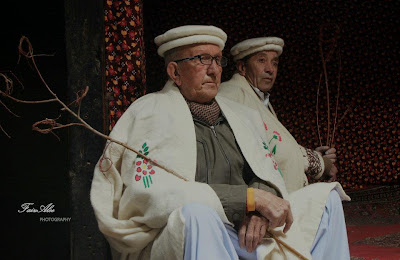Gojal
(Upper Hunza)
is a
fairy tale valley
famous
for
high
peaks,
fascinating
glaciers,
beautiful meadows,
awesome
pastures,
educated and hospitable community.
Besides natural wealth and beauty,
the
valley
harbors
a
diverse and endangered
mountainous
cultural traditions. Among
its total population of about 20 thousand souls
majority speaks Wakhi
(Xhikwor)
language;
while Burushaski and Domaaki languages are also
spoken in some villages.
Gojal
is geographically the
largest
Tehsil
of the
Northern Areas of
Pakistan and is spread over an area of about 8,500 sq.km at an elevation
ranges from 2,340m to 4,877m.
The
valley borders internationally with the
Xinjiang-Uighur
region of
People Republic of China through the famous
Khunjrab,
Kilik and Mintika passes and with the Afghan
Wakhan -Little Pamir (Pamir-i-Khurd) through Irshod Pass.
This is the ceremony to formally open the farming season. This ceremony depends on the extremes of weather to different places. In lower Gojal from Shishkat to Gulmit it is celebrated on 5 march. In upper Gojal, Shimshal and Chipurson valleys it is celebrated when the weather condition becomes normal and suitable for cultivation. The celebration continues for two days. For this ceremony people prepare a special dish called Samn (for recipe see the cuisine section) by processing wheat grains for about one months before this day. The Semn is cooked like pudding or halva as well as Semn breads are prepared.
Pirkhithn
During the first day people
gather at common places in the village while carrying with Khamali,
Samn
and some other traditional dishes. Here the villagers together eat these
dishes and offer common pray for the betterment of community
and good production of crops. During evening time the
villagers take a piece of a plant Pishpishunuk locally
called Suthors from a representative of
Shoghunputhuks. From here he takes it to the roof of the
traditional house and a traditional dish is prepared called
Mul (from wheat flour latter eat with butter). The Suthors
is then entered to the house from a opening in the centre of
the traditional houses
called Risin. From here that is
lifted to the field with the damp of livestock manure.
Thaghm
This day the people belongs to a particular family locally
called Shaghun Puthuk
came
in procession with a particular protocol holding sticks in
hand. First of all they perform the
Tumung in a old house. During the Tumung
they burn fire inside the house and check that where the smoke
goes. This is a old time believe that in which direction the smoke
spreads at that side of the village the production of wheat will be
more. In
this house a person from that family is dressed special
called Dhrukhs (Ox). From here the Shoghunputhuks
with the symbolic Dhirokhs proceed to a field where people
from the whole village gather and give great protocol to
Shoghunputhuks. In the field the symbolic Dhruksh
make some actions and perform like a typical oxen style.
The Khalifa (peson that performs religious rituals) prays for better crops, unity, and
success. After prayer, an elder
from Shoghunputhuk sprinkle seed to a small area of the field
and cultivate the portion of field through traditional old
time ploughing method (traditional ploughing equipments
pulled by 2 oxen). This is the formal opening of cultivation
in the village. Parents bring their children of 1-3 years (who
not before performed this) at the field and touches their
hands to the ploughing tools in order to become a good farmer
in future.

Thaghm Festival, Passu

Praying for Agricultural
Productivity during Thaghm Festival at Passu










No comments:
Post a Comment